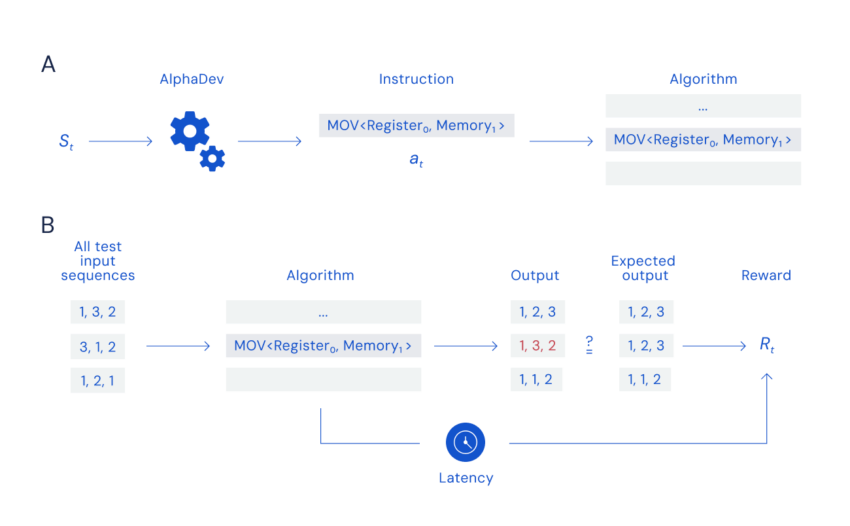
Artificial Intelligence (AI) has continued to evolve and disrupt the technology landscape in novel ways. One such groundbreaking innovation is Google’s DeepMind AlphaDev, an AI system that has made a significant leap in computational efficiency by creating sorting algorithms that outperform those designed by human programmers by a significant margin. Here we delve into the technical details of this breakthrough.
AlphaDev: Reinforcement Learning and Algorithm Generation
AlphaDev is based on DeepMind’s AlphaZero AI, a tool that has made waves in the AI space by achieving superhuman performance in complex games like Chess and Go. The underlying principle of AlphaZero, and now AlphaDev, is reinforcement learning – a type of machine learning where an AI agent learns to make decisions by taking actions in an environment to maximize some notion of cumulative reward.
In the case of AlphaDev, the AI system was tasked with creating sorting algorithms. The environment was defined as the task of sorting a list of numbers, and the reward was based on the efficiency and speed of the sorting process. Through continuous trial and error and learning from feedback, AlphaDev was able to come up with a novel sorting algorithm that was 70% faster than the best for lists of five pieces of data and 1.7% faster for lists of larger sizes1.
The Algorithm: A New Benchmark for Efficiency
To appreciate the efficiency of AlphaDev’s sorting algorithm, it’s helpful to understand the measure of algorithmic efficiency. In computer science, the efficiency of an algorithm is often evaluated based on the number of computational steps it requires to complete a task, known as time complexity, and the amount of memory it uses, known as space complexity.
AlphaDev’s algorithm set a new benchmark for time complexity in sorting algorithms. Its codes for sorting five numbers required 42 and 43 instructions, compared to the 46 instructions required by the fastest existing human-developed algorithm for the task2. This reduction in the number of computational steps translates into a significant increase in speed, making the algorithm up to 70% faster than the fastest existing algorithm.
Validation and Implications
After AlphaDev generated its new sorting algorithms, DeepMind submitted them to the organization that manages the C++ programming language for validation. After two months of rigorous testing, the algorithms were confirmed to be valid and more efficient than the existing ones3.
This validation has profound implications for computer science and the tech industry at large. With their enhanced efficiency, these new sorting algorithms could revolutionize many areas that heavily rely on data sorting, such as database management, search engine functioning, and online retail platforms.
The Future: AI in Algorithm Development
The success of AlphaDev underscores the potential of AI in algorithm development and the broader field of computer science. By harnessing the power of reinforcement learning, AI can iteratively optimize solutions to complex problems and achieve levels of efficiency that surpass human capability.
DeepMind’s AlphaDev is a harbinger of the future of AI in computer science, setting the stage for AI to revolutionize other areas of algorithm development. As AI continues to evolve and improve, we can expect to see more breakthroughs that redefine the boundaries of what is possible in computer science.
